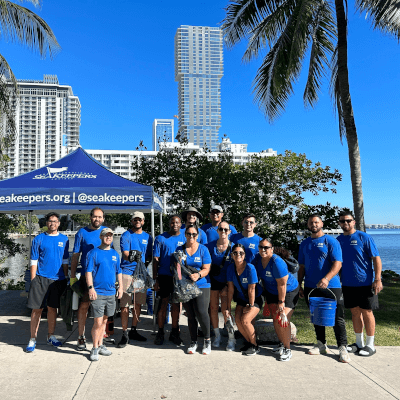Monthly Margaret Pace Park Cleanup
Miami, Florida
October 21, 2023
Overview
On Saturday, October 21st, The International SeaKeepers Society held a cleanup at Margaret Pace Park as a part of our series of monthly park cleanups. Margaret Pace Park is on the coast of Biscayne Bay and is located in a busy residential area in downtown Miami. The park is often full of people on a Saturday afternoon, with locals gathering to walk their dogs, play sports, do yoga, and meet friends. The amount of people that frequent this park makes it a hot spot for trash, and our volunteers do their best to remove as much as possible on a monthly basis. We were joined by 67 volunteers on this sunny morning, with 50 students joining us from the MBA program at FIU. Our volunteers set out with gloves, bags, and buckets with the mission of collecting as much trash as possible from the park’s grass, paying extra attention to the rocky shoreline and mangroves. After about 2 hours of hard work, we managed to fill 8 trash bags with our collections, weighing in at 125 pounds of trash removed from the park. Based on the data logged by six participants, the most frequently found items were bottle caps, plastic fragments, and cigarette butts. Small pieces of debris like these are frequently found at our cleanups, and unfortunately are the right size to be ingested by many creatures, which is why preventing litter from entering Biscayne Bay through our coastlines and storm drain systems is so important. We appreciate all of the volunteers who showed up this weekend and did their part for the health of our communities and our ocean, and we hope you join us again in the future!
Outing Goal
Marine Debris Tracker is a data collection app that allows the general public to contribute to an open-date platform and scientific research by recording the different types of litter, specifically plastic pollution, that they find in either inland or marine environments. Marine Debris Tracker was developed by the University of Georgia’s Jambeck Research Group, which SeaKeepers worked on in 2021 when the Jambeck Research Group collaborated with Ocean Conservancy to assess Miami’s plastic waste management, known as a Circularity Assessment Protocol. SeaKeepers again assisted the Jambeck Research Group’s Circularity Informatics Lab in 2022 with another Circularity Assessment Protocol in the Florida Keys. The researchers of the Jambeck Lab use the Marine Debris Tracker app to record their data, and with citizen scientists also using the app, more data can be collected in different areas. Using Marine Debris Tracker at our cleanups involves community members in creating a bigger picture of plastic pollution, and provides the means for new scientific findings to be generated as well as for effective local legislation to be informed. SeaKeepers is excited to be incorporating this app at our cleanups and continue our mission of coastal education, protection, and restoration. In this cleanup, 9% of volunteers participated in using the app to record data.
Marine Debris Tracker: https://debristracker.org/


You must be logged in to post a comment.